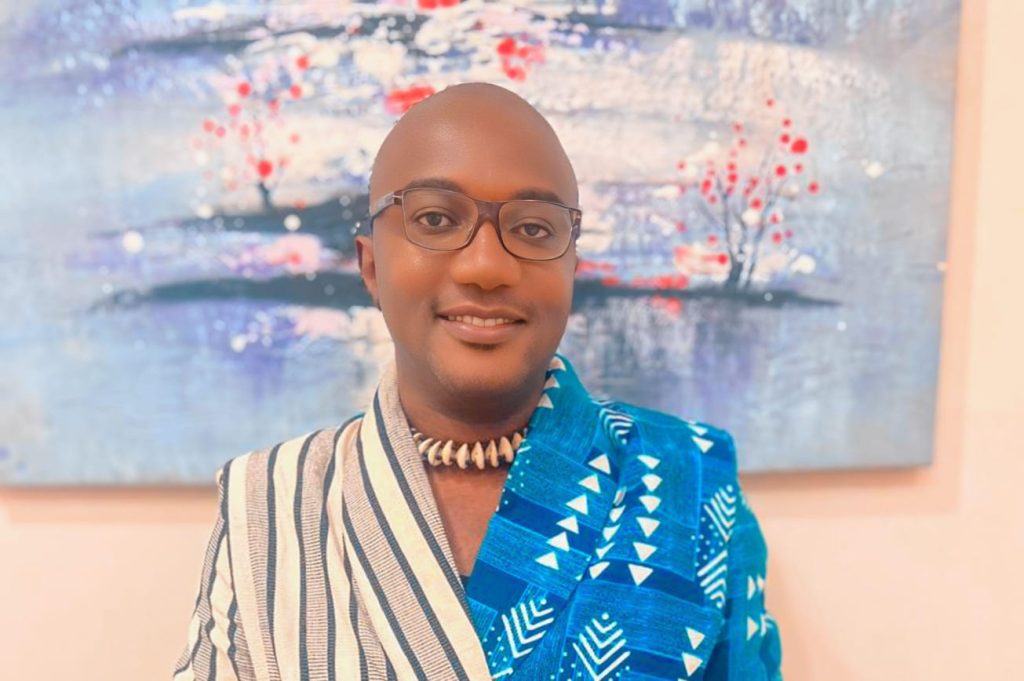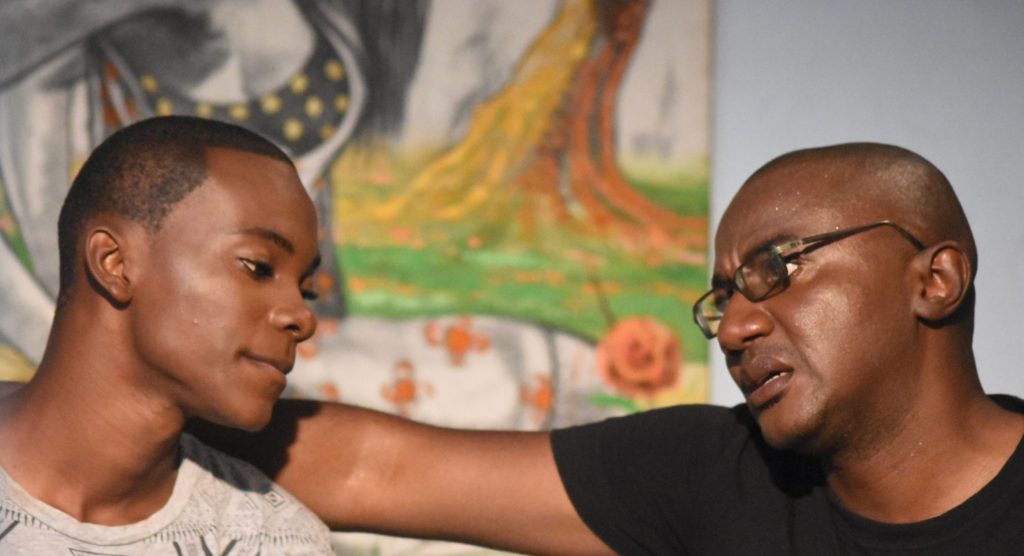Congo activist wants to ‘De-Westernize’ the LGBT struggle
Moïse Manoël-Florisse, is an African-Caribbean online journalist keeping an eye…
Jean-Claude Pongault wants to emphasize African identities in the struggle for queer liberation

The struggle for the rights of sexual minorities is too frequently dominated by ideas, voices, and stories from the global North and West, says Congolese human rights activist and artist Jean-Claude Pongault Elongo.
He’s at the heart of a movement in the central African country to re-emphasize indigenous African stories and ideas in the struggle for sexual and gender equality, in order to highlight local experiences and histories and reach the wider community on its own terms.
Pongault also uses the name Jean-Claude Doless Mbeli Ya Basakata in the Lingala language.
He is a founding member of Coeur-Arc-ciel, an activist organization based in Brazzaville, Republic of the Congo, and he spoke with 76Crimes to explain his views on social activism, arts, and de-Westernization in today’s post-colonial Africa.
Advocacy in the Congo
Erasing 76 Crimes: How did you come to found an LGBT+ and AIDS organization in the Republic of the Congo?
Jean-Claude Doless Mbeli Ya Basakata: Founded in 2016, Coeur Arc-en-ciel is the 2nd organization in the Republic of the Congo concerned with sexual and gender minorities, and to be honest, I prefer this terminology to “LGBT.” Indeed, the terms lesbian, gay, bi, and trans are imported Western concepts that substitute for the rich lexicon of our languages, which already more or less describe these realities, such as “nganga tchibanda” (priest dressed as a woman) in the Kimbundu language of Angola or “kitécha” (3rd gender) in the Kilouba language of the Democratic Republic of Congo.
More broadly, based on Resolution 275 of the African Commission on Human and Peoples’ Rights of 2014 and in a holistic approach aimed at rolling back the AIDS epidemic, we address civil society as a whole, although we prioritize targeting key populations who are most exposed to HIV from an epidemiological point of view.
Erasing 76 Crimes: How does your organization deliver prevention and awareness in the African context?
Jean-Claude Doless Mbeli Ya Basakata: We developed plaidoy’art [an activist art contest] as a tool for de-Westernizing our battles and struggles, because all too often, we wanted to reproduce modes of action inspired by the countries of the North, but which didn’t convey our symbolic identity.

This gave rise to the idea of producing a social drama, a film called Michel.le.s, based on the true story of a young gay man from Brazzaville, Michel, whose father refused to finance his studies, while his brother, supported by his father, failed to pass the baccalauréat [a final high school exam].
Our populations and communities in Central Africa are saturated with information and cultural content from the countries of the North and the West, and as a result, we too need to produce narratives and stories that shed light on our realities, our experiences, our struggles, our ups and downs, our happiness and our conquests.
Our aim is to be able to tell a universal story set in a Congolese cultural context.
Erasing 76 Crimes: Why choose social fiction rather than documentary? And why the choice of a feature film for a first cinematographic production?
Jean-Claude Doless Mbeli Ya Basakata: Documentary is an overly prescriptive film genre that doesn’t leave enough room for the cinephile’s imagination, whereas social fiction involves an interplay of actors and characters with protagonists who can avoid showing reality too head-on.
Social fiction highlights Congolese cultural and aesthetic elements, such as liputarization (wearing colorful African clothing) [Editor’s note: liputa refers to a loincloth in the Lingala language], eating with one’s fingers, or dialogues in Lari or Kituba, the main vernacular languages of the Congo.
Nevertheless, it would be wrong to think that we haven’t drawn inspiration from other international film productions, notably the film “Bobby Seul Contre Tous” [“Prayers for Bobby“].
De-Westernizing activism
Erasing 76 Crimes: You speak of de-Westernization, yet 64 years after independence, we are all more or less Westernized, whether in terms of dress or religion. Don’t you think you’re fighting a rearguard action or a battle against the times, against a creolized era?
Jean-Claude Doless Mbeli Ya Basakata: Que nenni. [Not at all.] In line with Charles Gueboguo‘s work, there’s still a lot of information to be gathered about the pre-colonial origins of homosexuality in Africa, because my story didn’t begin at Stonewall in New York, but in Kinshasa, with the emergence of Kipopo [Click for more information.] in the 70s and 80s, and it has its roots in the legendary kingdom of Kivimba, which serves as the setting for our play of the same name.
If decolonization means getting rid of the cumbersome ornaments of a colonization that was imposed on us, de-Westernization aims to enable us to reappropriate an endogenous queer subculture, while valorizing elements of immemorial African cultural heritage, such as Congolese rumba, in the service of the national advocacy of our strategy against HIV and gender-based violence.
Erasing 76 Crimes: Why did you choose to develop a play, after a feature-length fiction film?
Jean-Claude Doless Mbeli Ya Basakata: A play has many advantages over a film, particularly in terms of budget. However, there are also constraints, and we needed a production team to support us: artistic director, stage director, sound and lighting technicians.
We also had to find a venue, and we had to record and edit the video for broadcast on YouTube. But once we’d overcome these obstacles, we’re proud to have been able to produce a play on a subject of general interest, such as the fight against HIV, the use of PrEP, or the fight against violence against women, not forgetting raising awareness of homophobia.
Last but not least, the medium of theater allows our members to express themselves through song and dance, which enables us to commune with our Brazzaville audience. And I have to say, after a few years’ hindsight, it works.
The Kipopo language
Below is an explanation of the Kipopo language, loosely translated into English from the article “Au Congo, une communauté LGBT dans l’ombre” (“In the Congo, an LGBT community in the shadows”) published by the Swiss news outlet 360.
The language “kipopo” allows Congolese gays to find their way around and understand each other. For example, “being at 12 o’clock” means being excited; a “walker” is a gay man; and “Berlin Wall: refers to hostile people. One kipopo speaker expains, “When we are in a group and someone comes running, we say ‘Berlin Wall’ and change the subject.” Another mentions, with a mischievous laugh, more sexual expressions. “To describe a passionate sexual relationship, we say ‘Friends, if you had seen the crash site, there were 500 dead!’ But if we mention a ‘small glider,’ it means a crappy moment,” he jokes. This vocabulary is specific to Congolese gays. “A straight person won’t understand!”




